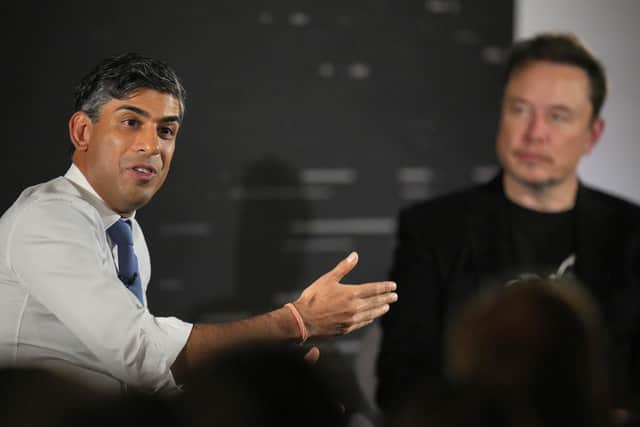To his credit the Prime Minister has started taking the right steps on AI - David Blunkett
Take the much-trailed proposition by our current Home Secretary, Suella Braverman, that the one way of getting rid of homelessness is to persecute those who are homeless. This is entirely in keeping with her notion of discouraging organised criminals from trafficking refugees from across the continent, by persecuting the refugees.
Despite the hype and pre-briefing, this ridiculous proposition did not actually appear in any of the legislative proposals published this week.
Advertisement
Hide AdAdvertisement
Hide AdIn Suella Braverman’s case, there is at least a purpose. The purpose is to get her elected by Conservative Party members when the Tories do what they do best: choosing a new leader who appeals to their rank and file and denying the consequences for the country as a whole.


For me, some of the declarations of intent around the speech were déjà vu. As Home Secretary, I remember declaring “life must mean life” for the most heinous crime, and at the time I was able to achieve it.
But, as on this occasion, what is really lacking is any proposition that will confront, head-on, the major challenges of the day. An ageing population and a complete neglect of resolving the minefield of social care, is just one.
Beginning the long and difficult process of regulating artificial intelligence is clearly another. On this, the Prime Minister must be handed some credit.
Advertisement
Hide AdAdvertisement
Hide AdOver the last three weeks, he's managed to get the issue on the public agenda and to have held a reasonably successful gathering at Bletchley Park – famous for the intelligence gathering capacity in the development of early computer systems during the Second World War.
Unfortunately, getting the great and the not so good together is not the same thing as actually taking action. Frightening people to death with the idea that algorithms are going to take over the whole of the world is no substitute for thinking through what we, as humans, must do to prevent the dominance of robotics.
There are very real – and genuinely concerning – aspects to the rapid development of a technology which might soon be able to replicate itself and would simply not need the input of ‘human intelligence’.
Equally, there is absolutely nothing new about the supposedly beneficial gains, such as Elon Musk's belief that AI will do away with “the need to work”.
Advertisement
Hide AdAdvertisement
Hide AdThere are jobs which, if undertaken in ways that lifted the burden from the shoulders of those currently having to undertake them, would be a major gain for humanity. But there are vastly more forms of employment which are not only better undertaken by people with emotions and who can empathise with each other, but also where the work itself is critical to the psychological and physical well-being of those carrying it out.
Of course, there are many people who retire early, who find all kinds of meaningful activity to fill their lives. From volunteering to gardening, caring for others – including elderly parents – or the joy of grandchildren.
There are, however, many others (and I'm one of them) who dread the idea of not being focused on sometimes stressful but mainly interesting activities which are rewarding in a whole range of ways.
What Elon Musk did not address is how you distribute the productivity gains which come from the use of technology. Historically the losers have always been from the same economic and social background – namely the poorest in society.
Advertisement
Hide AdAdvertisement
Hide AdExtremely rapid economic, technological and cultural change is fine when you're better off, when the impact is generally benign, but it's something entirely different if it takes your job away without providing you with an alternative income or purpose in life.
That has been the lesson, historically, which we should learn today. As we approach an acceleration of such changes in our lives, we need a social democratic approach which allows us to moderate the worst impact, whilst sharing the fruits of growth, and the financial surplus which, as so often, would otherwise go to the already very rich and powerful.
My hope, therefore, is that in a year's time there will be another King’s Speech, which will, even in embryo, start to address the very big and often daunting issues of the moment, and years to come.
Self-evidently, climate change will be high on the agenda, with practical measures to ensure that the National Grid can supply enough electricity to do something as simple as charge the rapidly increasing number of electric vehicles. To avoid, for instance, at Junction 45 on the M1, the necessity of diesel-generated backup electricity when the Grid can't meet the demand.
Advertisement
Hide AdAdvertisement
Hide AdA government which must understand that, far from taking away the chance of employment, what we really need is to skill and re-skill the population to master the technology and take on the ability both to innovate and control the future.
After all, willing the means, rather than fearing the ends, is what most politicians came into public life to deliver. Making a difference to the world of tomorrow can only be achieved by those who have the vision today.
David Blunkett is a Labour Party politician, and served as the MP for Sheffield Brightside and Hillsborough.